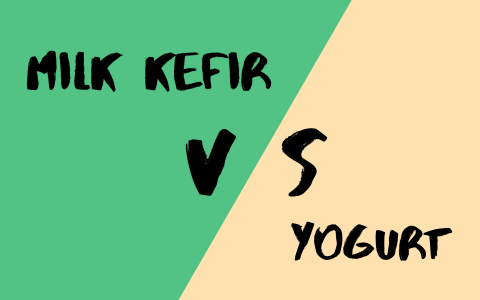Milk kefir contains up to 60 strains of bacteria and yeasts, making them a very rich and diverse probiotic source. While yogurt often contains only a few strains and don’t contain any yeasts.
While both are fermented products milk kefir and yogurt differ in consistency and content.
| In 240 ml | Plain yogurt 2% from the store | Homemade milk kefir |
| Vitamins | D | A, B1, B2, B3, B6, B9, B12, C, D, E, K2 |
| Microelements | Iron, Potassium, Calcium | Iron, Potassium, Calcium, Magnesium, Phosphorus, Zinc |
| Microbiota | Up to 5 probiotic bacteria | Up to 60 probiotic bacteria |
| Yeasts | None | Kluyveromyces marxianus, Kluyveromyces lactis, Saccharomyces fragilis, as well as strains of yeast that do not metabolize lactose, Saccharomyces cerevisiae, Torulaspora delbrueckii, and Kazachstania unispora |
| Calories | 168 | 140 |
| Sugars | 7g | 6g |
| Proteins | 17g | 10g |
| Fats | 5g | 8g |
The milk kefir is a clear winner here. But what about convenience you may think? Yogurt is readily available at the store, but homemade kefir cannot be purchased. And that is the beauty of it. Homemade milk kefir is even closer to you, it can be produced at your home.
Get milk kefir grains to start your homemade milk kefir 🙂



